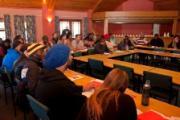
Social movements discussed the challenges they are facing and different initiatives that they are involved in at a recent Sociology conference on Politics at a distance from the state.
Gladys Mpepho of the Grahamstown Unemployment People’s Movement (UPM) spoke of the challenges that her organisation is faced with. “In order to get things from the government we have to fight the government,” she said. “By challenging the state we are declaring a war.”
She said that members of the current administration are only interested in enriching themselves. The situation, she added, was even worse under Jacob Zuma’s presidency because he continues to marry more wives who have to be maintained by the state.
Lekhetho Mtetwa of the Landless People’s Movement (LPM) in Johannesburg said that in Protea South, the government was forcibly removing shack dwellers to turn the place into houses that are sold for a few hundred thousand.
He added that LPM continues to mobilise shack dwellers to stop government officials from bulldozing them.
Bandile Mdlalose of Abahlali baseMjondolo said that members of their organisation were not consulted in the decision-making processes. She added that since they were not receiving any service from government, they decided to institute a ‘no land, no house, no vote’ policy.
Mdlalose cautioned against reliance on the state to provide services. “If you expect that the state will do something for you, I feel sorry for you because you will be left behind,” she said.
Xolisile Gqamlana of the Farm workers Movement said that he would have been happier if members of the South African parliament were present at the discussions so that they can listen to his experience firsthand.
He said that representatives of the Departments of Labour and Land Affairs were not of any help to farm workers. When representatives of the two departments visit farms, Gqamlana said, they only consult farmers rather than consulting the farm workers as well.
Farmers do not follow the labour regulations on dispute resolution. “If you have a dispute with the farmer he can just evict you and leave you in the middle of the road with all your belongings,” said Gqamlana.
Theodorah Luthuli of the Progressive Youth Movement said that they were fighting against the bucket-system in Khayelitsha, Cape Town. “We are fighting to get our dignity back,” she said.
On Freedom Day they marched to tell government that they could not say they were free when they are still using the bucket system. The bucket system has stopped working and they have been provided with toilets though the each toilet will be shared by ten people.
Mkhululi Sijora of the Sounds of the South said that his organisation uses arts to alert people of what is happening around them. He added that they chose the arts because they “believe that the arts have the potential to influence minds.”
Upon realising that the living conditions are not changing despite participating in elections members of Sounds of the South went around the Western Cape encouraging people not to participate in elections. “By voting, the people are taking the little power that they have and give it to a political party.”
These social movements agreed to work together in the future.
